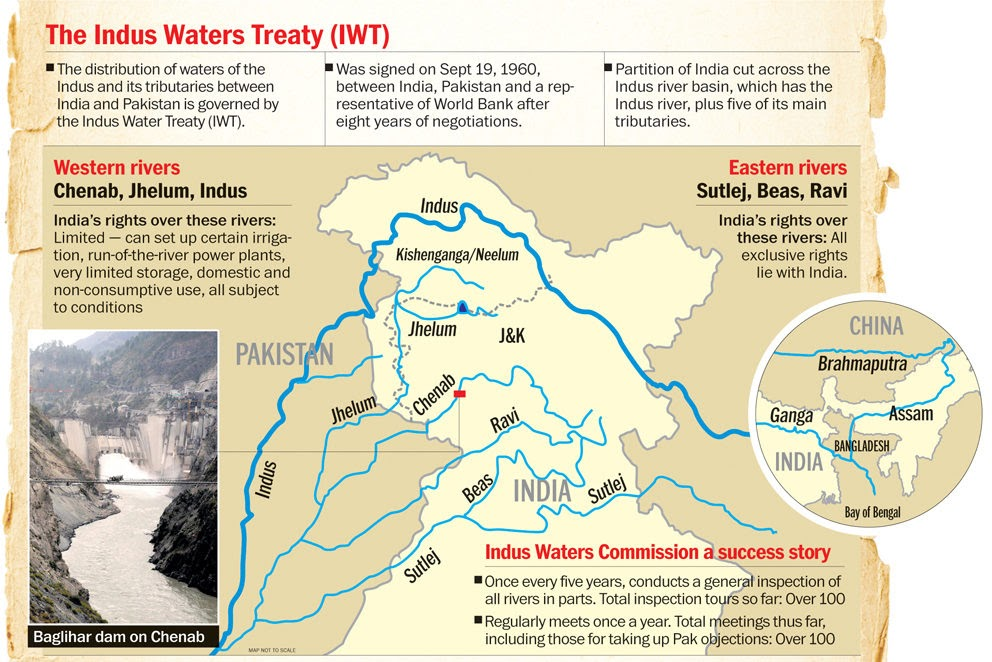Pahalgam Attack: A Suspension of Indus Waters Treaty,2025
Introduction
After the Pahalgam Attack in the Baisaran valley, Jammu and Kashmir, which killed 26 people, Prime Minister Narendra Modi’s Cabinet Committee on Security endorsed a five-point response plan against Pakistan. According to reports, the Pahalgam Terror Attack was carried out by the Resistance Front (TRF), a front for the outlawed Lashkar-e-Taiba (LeT) organization located in Pakistan.
What is the 5-Point Action Plan Announced by India After the Pahalgam Attack?
- Suspension of the Indus Waters Treaty: The 1960 Indus Waters Treaty (IWT) has been suspended by India until Pakistan stops sponsoring cross-border terrorism. It shows a change in India’s strategic thinking by employing hydrological leverage as a means of exerting pressure.
- Closure of the Attari-Wagah Border Check Post: India has suspended all human and commercial traffic at the Integrated Check Post (ICP) at Attari, Punjab. By May 1st, 2025, only those who have crossed across with legitimate documentation will be allowed to return.
- Cancellation of SAARC Visa Exemption Scheme for Pakistan: For Pakistani nationals, India has terminated the South Asian Association for Regional Cooperation (SAARC) Visa Exemption Scheme (SVES). Any SVES visas that have already been granted are deemed null and invalid.
- Expulsion of Pakistani Military Advisors: The advisors for Pakistan’s air, navy, and defense in New Delhi have been deemed persona non grata and are required to leave India. Moreover, India will remove its own experts from Islamabad.
- Reduction of Diplomatic Personnel: By May 1, 2025, India plans to cut the number of employees at its High Commission in Islamabad from 55 to 30. With the intention of halting formal bilateral communication, this is a blatant decline in diplomatic interaction.
What are the Potential Geopolitical Factors Behind Pakistan’s Pahalgam Attack?
- India’s Kashmir Policy
- India’s illegal occupation of Pakistan-occupied Kashmir and the 2019 removal of Article 370 are seen by Pakistan as challenges to its self-proclaimed sovereignty.
- Pakistan may have turned to violence to reclaim its place in the area as a result of its growing marginalization and India’s achievements in stabilizing Kashmir.
- International Isolation
- Because of Islamabad’s deteriorating dependability and returns, Pakistan’s longstanding friends, including the US, Gulf states, and even China, are turning away.
- Pakistan’s strategic significance to the US has also drastically decreased after the US withdrew from Afghanistan in 2021, leaving it diplomatically isolated.
- Economic Collapse
- Pakistan has become more unstable due to a collapsing economy, skyrocketing inflation, and shoddy governmental institutions.
- Pakistan’s economic problems have become worse and recovery prospects have been hampered by the growing Baloch insurgency and ongoing terrorist attacks along its western border, which have turned the nation off to international investment.
- Global Geopolitical Messaging
- Given that PM Modi’s journey to Saudi Arabia and the US Vice President’s trip to India coincided with the Pahalgam incident, it appears that Pakistan is reaffirming its regional dominance and indicating its ongoing influence in South Asia.
- Despite international censure, Pakistan could use the attention as a chance to reestablish diplomatic ties in the face of its increasing isolation.
What is the Significance of the Indus Waters Treaty?
- Indus Waters Treaty (IWT)
- After India and Pakistan negotiated for nine years, the World Bank mediated the signing of the IWT in Karachi in 1960.
- Although the “Western Rivers” (Indus, Jhelum, and Chenab) are set aside for Pakistan, the treaty grants India unlimited use of the “Eastern Rivers” of the Indus system (Ravi, Beas, and Sutlej), so granting Pakistan access to around 80% of the total water.
- According to the treaty, India is permitted to utilize the Western Rivers for certain non-consumptive purposes, including hydroelectric power, agriculture, and navigation, provided that certain design and operating requirements are met.
- A three-tiered dispute resolution mechanism was established by IWT, which included a Permanent Indus Commission (PIC) to guarantee yearly communication and collaboration, a Neutral Expert appointed by the World Bank or jointly by India and Pakistan, or a Court of Arbitration if necessary.
- Actions Regarding Indus Waters Treaty (IWT)
- With an emphasis on the Kishenganga and Ratle hydropower projects, India submitted its first notice under the IWT in 2023, asking for changes to the Treaty.
- Pakistan expressed concerns, arguing that these projects breach the IWT’s requirements even though they are categorized as “run-of-the-river” and are meant to produce energy without interfering with the river’s natural flow.
- In 2024, India sent a follow-up notification requesting that the IWT be reviewed and modified.
- A properly approved agreement between the two countries permits changes to the Treaty under Article XII(3) of the IWT.
- India’s Suspension of the Indus Waters Treaty (IWT)
- India’s suspension signifies a change in water diplomacy related to cross-border terrorism and is the first suspension of the pact since its establishment.
- According to Article 62 of the Vienna Convention, a nation may repudiate or withdraw from a treaty if its continuance is impossible due to a significant change in circumstances.
What is the Impact of Suspension of Indus Waters Treaty?
- Regional Stability and Security
- Escalation of tensions: The IWT has withstood even during wars between India and Pakistan. Suspending it could be seen as a hostile act and might escalate military or diplomatic tensions.
- Undermines trust: This could erode what little bilateral cooperation exists between the two nations, making other negotiations more difficult.
- Water Security and Humanitarian Impact
- Pakistan’s dependency: About 80% of Pakistan’s agriculture relies on water from the Indus River system.
- Urban centers at risk: Cities like Lahore and Karachi could face acute water shortages.
- Economic Consequences
- Agriculture disruption: Pakistan’s agri-based economy would take a massive hit.
- Energy shortages: Many hydropower projects in Pakistan depend on Indus basin rivers. Suspension could affect electricity generation.
- International Repercussions
- Violation of international norms: The IWT, brokered by the World Bank in 1960, is considered a successful example of water diplomacy.
- Legal consequences: Pakistan could take the case to international arbitration or the International Court of Justice.
- Environmental Impact
- Disruption in river flows could harm ecosystems that depend on consistent water supply.
- Mismanagement due to lack of coordinated oversight could worsen climate change effects like floods or droughts.
What Long-Term Approach Should India Take Toward Pakistan?
- Strengthening Deterrence
- India has to have a robust military presence at the border, updating its troops with smart fence and high-tech border surveillance systems.
- Strong border security and other effective deterrents can stop Pakistan from raising tensions, especially in relation to Kashmir or possible military invasions.
- Utilizing UN Security Council
- At the UN Security Council, India should continue to draw attention to Pakistan’s support for terrorist organizations and stress international censure.
- India could use the UN Charter’s Article 51, which advocates for collective action against terrorism, to rally support from around the world for tougher sanctions on Pakistan.
- India could also push for Pakistan to be included to the Financial Action Task Force’s (FATF) blacklist due to its role in financing terrorism in order to coerce Pakistan into complying.
- Internal Resilience and Social Cohesion
- India needs to take the initiative to fight radicalization, concentrating on border areas that are at risk.
- Creating unity via public awareness campaigns that prioritize peace, pluralism, and national cohesiveness is equally as important as implementing security measures.
Conclusion
The suspension of the Indus Waters Treaty in response to the Pahalgam attack marks a pivotal shift in India’s strategy, using water as leverage against Pakistan’s cross-border terrorism. While it signals strong diplomatic resolve, it also raises concerns over regional stability, humanitarian fallout, and environmental risks, underscoring the need for a balanced yet firm long-term approach.
Frequently Asked Questions (FAQs)
What happened in the Pahalgam attack?
A brutal Pahalgam attack occurred on April 22, 2025, in the Baisaran meadows near Pahalgam, a popular tourist destination in Jammu and Kashmir. Terrorists targeted a group of tourists, resulting in the death of at least 26 people and injuries to many others.
Where is Pahalgam located?
Pahalgam is a popular hill station located in the Anantnag district of Jammu and Kashmir, India. The attack took place in Baisaran meadows, approximately 5 kilometers (3 miles) from the Pahalgam town.
Who is responsible for the Pahalgam attack?
The Resistance Front (TRF), believed to be a proxy outfit of the Lashkar-e-Taiba (LeT), has claimed responsibility for the Pahalgam terror attack.
What was the motive behind the Pahalgam attack?
While the investigation is ongoing, TRF’s statement suggests opposition to the issuance of domicile certificates to non-locals, viewing it as a step towards demographic alteration in the region. Eyewitness accounts also indicate that the attackers were targeting non-Muslims.
What actions has the Indian government taken?
India has strongly condemned the Pahalgam attack and vowed to punish the perpetrators. Diplomatic actions against Pakistan have been initiated, including the suspension of the Indus Waters Treaty, closure of the Attari-Wagah border, reduction of diplomatic staff, and cancellation of the SAARC Visa Exemption Scheme for Pakistani nationals. Security has also been beefed up across the Kashmir Valley, and a large-scale search operation is underway
Sources:
- https://www.hindustantimes.com/india-news/pahalgam-terror-attack-live-updates-j-k-anantnag-kashmir-pm-narendra-modi-india-pakistan-indus-water-treaty-april-24-101745452238041.html
- https://en.wikipedia.org/wiki/2025_Pahalgam_attack
- https://www.bbc.com/news/articles/cy9vyzzyjzlo
- https://www.thehindu.com/news/national/pahalgam-jammu-kashmir-terror-attack-tourists-dead-injured-pakistan-april-24-2025/article69485323.ece
- https://indianexpress.com/article/india/pahalgam-guide-became-guardian-angel-for-chhattisgarh-bjp-worker-hugged-the-children-saved-their-lives-9964355/
- https://timesofindia.indiatimes.com/india/house-of-local-terrorist-adil-thokar-involved-in-pahalgam-terror-attack-demolished/articleshow/120604277.cms
- https://economictimes.indiatimes.com/news/india/pahalgam-terror-attack-shows-pakistans-calculated-diplomacy-terror-operation/articleshow/120593879.cms?from=mdr
- https://pib.gov.in/PressReleseDetailm.aspx?PRID=2123972®=3&lang=1

